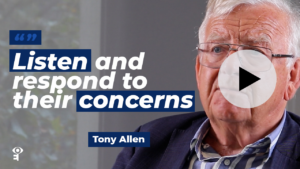Clinical Negligence Case Study: Handling Grievances Through Effective Communication and Negotiation
Overview
Mediator: Tony Allen
Sector: Medical/Clinical Negligence
Outcome: Through empathetic communication, effective negotiation, and a willingness to address the family’s concerns, the mediation process resulted in a mutually agreeable settlement that brought some closure to the situation.
Background
Clinical negligence cases are tough – the process can lead to significant distress for both patients and their families. In this case, a patient experienced repeated inadequate medical care, ultimately resulting in their death. The family, understandably aggrieved, sought legal recourse to seek compensation for their loss and address the concerns they had.
An Experienced Mediator
Tony Allen, a mediator with extensive experience in handling medical malpractice cases was tasked with resolving the dispute. Tony recognised the importance of empathy and effective communication in delicate situations, such as this. A senior manager from the trust met with the family to apologise for the shortcomings in the patient’s care and express genuine remorse for their loss. This gesture, coming from a high-ranking official, demonstrated the hospital’s commitment to accountability and compassion.
The Negotiation Process
The mediation session commenced with the family expressing their pain and frustration over the events that led to their loved one’s death. The mediator facilitated open and respectful communication between the parties, ensuring that each side had ample opportunity to be heard. During the negotiation phase, the trust initially made an offer that fell short of the family’s expectations.
Recognising the sensitivity of the situation, the mediator suggested that the family directly convey their concerns to the hospital representative. This approach allowed the family to express their dissatisfaction in their own words, making it more personal and impactful. The trust, in turn, took the family’s feedback seriously and revised their offer to a more acceptable level.
The Outcome
A mutually agreeable settlement was agreed that brought some closure to the situation. The family felt that their grievances had been heard and addressed, while the hospital acknowledged its shortcomings and took steps to improve its patient care practices.
Key Learnings
This case study highlights the importance of effective communication and empathy in addressing grievances and resolving conflicts. Having an experienced mediator when dealing with sensitive matters like medical malpractice, transparency, accountability, and a genuine desire to rectify mistakes are crucial to fostering trust and achieving a satisfactory outcome for all parties involved.
Recommendations
- Embrace Transparency and Accountability: Proactively acknowledge mistakes and take ownership of shortcomings.
- Communicate with Humility and Empathy: Listen attentively to the concerns of aggrieved parties and express genuine remorse.
- Involve High-Level Representation: Leverage senior management’s presence to demonstrate commitment and sincerity.
- Empower Negotiations with Empathy: Facilitate open and respectful discussions, ensuring each side feels heard.
- Recognise the Power of Direct Communication: Allow aggrieved parties to directly convey their concerns to the responsible parties.
- Seek Creative Solutions: Be open to revising initial offers and exploring alternative approaches to find common ground.
Conclusion
By following these recommendations, mediators can help claimants and healthcare organisations effectively address grievances, allowing them to foster trust with patients and their families, and build a culture of patient safety and accountability.



